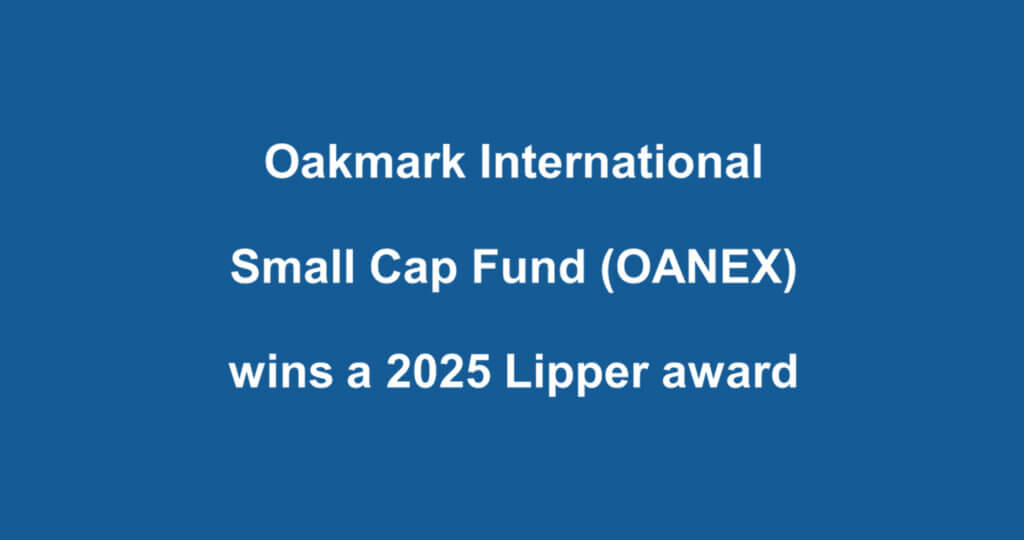Oakmark International Small Cap Fund - Investor Class
Average Annual Total Returns 03/31/13
Since Inception 11/01/95 10.16%
10-year 14.54%
5-year 4.71%
1-year 4.65%
3-month 5.87%
Gross Expense Ratio as of 09/30/12 was 1.41%
Past performance is no guarantee of future results. The performance data quoted represents past performance. Current performance may be lower or higher than the performance data quoted. The investment return and principal value vary so that an investor’s shares when redeemed may be worth more or less than the original cost. The performance of the Funds does not reflect the 2% redemption fee imposed on shares redeemed within 90 days of purchase. The most recent month-end performance data can be found here.
The Oakmark International Small Cap Fund returned 6% for the quarter ended March 31, 2013, slightly underperforming the MSCI World ex U.S. Small Cap Index, which returned 7% for the same period. For the Fund’s fiscal six months, the return was 15%, compared to 12% for the MSCI World ex U.S. Small Cap Index.
The top contributing stock for both the quarter and six-month period was Myer Holdings, Australia’s largest department store group. Myer performed well during the holiday season, and as a result, its second-quarter sales rose 2.1%. The company has reported nine straight months of positive comparable sales growth, a very encouraging trend. Myer has invested in systems, has done a very good job reducing costs, and is continuing to drive its highly profitable Myer Exclusive brands. The company is now focused on profitably growing the top line and making Myer a more competitive retailer. It is working to optimize product mix and space through refurbishing its stores and through ongoing changes, such as investing in service, improving its merchandise offerings, bringing its pricing in line with international levels, and providing a more credible online experience. We remain optimistic that Myer will continue to grow shareholder value over the long term.
The largest detractor from the Fund’s performance for the past quarter was gategroup, the world’s largest independent provider of catering services to the airline industry. gategroup released preliminary 2012 results in February that were in line with its recently lowered guidance, but its 2013 outlook was below market forecasts, which led to a decline in share price. The lower profitability at gategroup is coming from weak performance at its European operations, where EBITDA margins have declined from 9% to 5.75% over the past two years. gategroup is adjusting its footprint in Europe to respond to changes in customer demand, but we believe it will take until 2014 for these actions to begin to improve its profitability there. The downturn in European profitability has been larger than we forecast when we initially invested in gategroup. However, we believe management is taking the appropriate actions to restructure the business and that current valuations do not reflect these actions or the company’s continued growth in North America and the emerging markets, where it continues to perform well. Although gategroup has been a disappointing investment over the past 18 months, we continue to see value in the stock and thus remain shareholders.
While international stocks have been performing well, this hasn’t hindered our ability to find new attractive investment candidates. We added eight securities to the Fund this quarter. In Japan we purchased shares in Capcom, a software gaming company, and Nihon Parkerizing, a specialty chemical company. We also reintroduced two former Fund holdings, both regional South Korean banks: BS Financial Group and DGB Financial Group. Other new purchases included Norma Group, a German auto parts supplier; Saft Groupe, a French battery manufacturer; Countrywide, a U.K. property services group; and DSV A/V, a Danish transport company. We sold Brunel International, TKC, Fourlis Holdings, Burckhardt Compression, Duerr and Pasona Group.
Because we continue to believe that the U.S. dollar remains weak against some currencies, we maintained hedge positions on five of the Fund’s currency exposures. At the recent quarter end, we had hedged 57% of the Fund’s Australian dollar, 57% of the Norwegian krone, 31% of the Swiss franc, 12% of the Japanese yen and 34% of the Swedish krona exposures.
We thank you for your continued confidence and support.
As of 3/31/13, Myer Holdings, Ltd. represented 1.9%, gategroup Holding AG 1.7%, Capcom Co., Ltd. 2.1%, Nihon Parkerizing Co., Ltd. 0%, BS Financial Group, Inc. 1.6%, DGB Financial Group, Inc. 1.6%, NORMA Group AG 0.3%, Saft Groupe SA 1.6%, Countrywide PLC 0.2%, DSV A/S 0.1%, Brunel International NV 0%, TKC Corp. 0%, Fourlis Holdings SA 0%, Burckhardt Compression. Holding AG 0%, Duerr 0%, and Pasona Group, Inc. 0% of the Oakmark International Small Cap Fund’s total net assets. Portfolio holdings are subject to change without notice and are not intended as recommendations of individual stocks.
The MSCI World ex U.S. Small Cap Index (Net) is a free float-adjusted market capitalization index that is designed to measure global developed market equity performance, excluding the U.S. The MSCI Small Cap Indices target 40% of the eligible Small Cap universe within each industry group, within each country. MSCI defines the Small Cap universe as all listed securities that have a market capitalization in the range of USD200-1,500 million. This benchmark calculates reinvested dividends net of withholding taxes using Luxembourg tax rates. This index is unmanaged and investors cannot invest directly in this index.
Investing in value stocks presents the risk that value stocks may fall out of favor with investors and underperform growth stocks during given periods.
The stocks of smaller companies often involve more risk than the stocks of larger companies. Stocks of small companies tend to be more volatile and have a smaller public market than stocks of larger companies. Small companies may have a shorter history of operations than larger companies, may not have as great an ability to raise additional capital and may have a less diversified product line, making them more susceptible to market pressure.
Investing in foreign securities presents risks that in some ways may be greater than U.S. investments. Those risks include: currency fluctuation; different regulation, accounting standards, trading practices and levels of available information; generally higher transaction costs; and political risks.
The discussion of the Fund’s investments and investment strategy (including current investment themes, the portfolio managers’ research and investment process, and portfolio characteristics) represents the Fund’s investments and the views of the portfolio managers and Harris Associates L.P., the Fund’s investment adviser, at the time of this letter, and are subject to change without notice.







